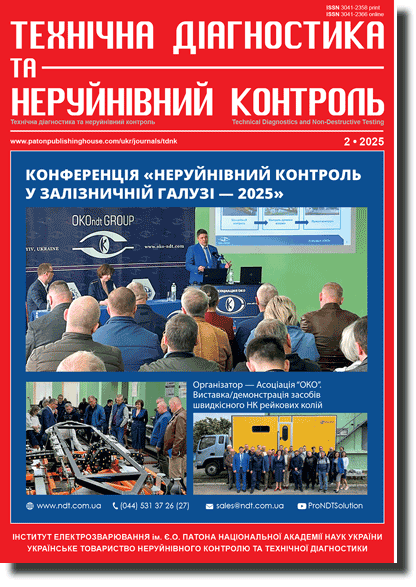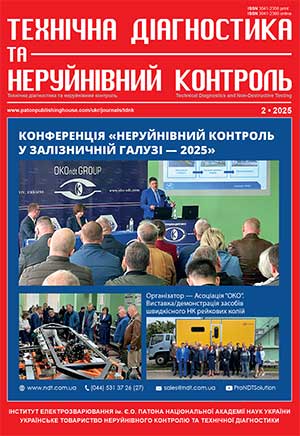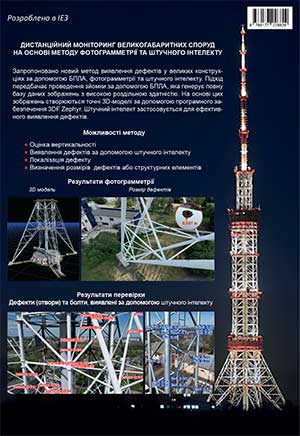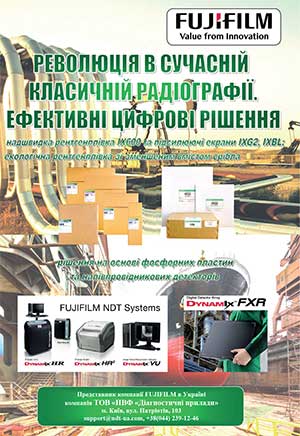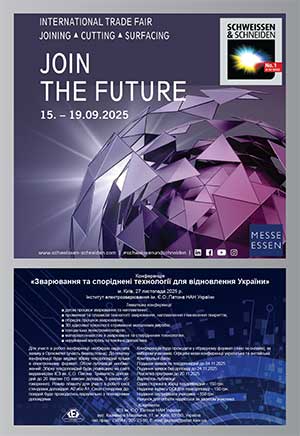Доступ для скачування ПДФ файлів журналів для підписників та рецензентів наукометричних баз.
Організація: Elsevier for content access(ПДФ файли журналів виданих раніше 2024 року відкриті для завантаження))
Організація: Elsevier for content access(ПДФ файли журналів виданих раніше 2024 року відкриті для завантаження))
| 2025 №02 (06) |
DOI of Article 10.37434/tdnk2025.02.01 |
2025 №02 (02) |
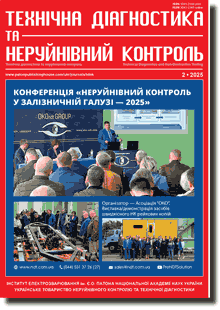
Технічна діагностика і неруйнівний контроль, 2025, №2, стор. 3-11
Підвищення ефективності діагностики великогабаритних конструкцій на основі використання БПЛА та нейронних мереж
Л.М. Лобанов, І.Л. Шкурат, Д.І. Стельмах, О.П. Шуткевич, В.В. Савицький
ІЕЗ ім. Є.О. Патона НАН України. 03150, м. Київ, вул. Казимира Малевича, 11. E-mail: nnashkurat2909@gmail.comУ статті представлено підхід до дистанційної діагностики пошкоджень великогабаритних інженерних конструкцій із використанням безпілотних літальних апаратів (БПЛА) і згорткових нейронних мереж. Дослідження було проведено з метою автоматизації процесу виявлення структурних дефектів конструкції Київської телевежі. Методологія дослідження передбачала збір і попередню обробку 14187 зображень та розробку модифікованої архітектури нейронної мережі U-Net для сегментації пошкоджень. Експериментальне дослідження різних архітектурних налаштувань моделі продемонструвало ефективність запропонованих модифікацій, які дозволили знизити похибку виявлення дефектів на 3…5 % порівняно з базовими моделями. Встановлено, що оптимальна кількість ітерацій навчання становить 15–20 епох. Розроблена модель продемонструвала здатність виявляти пошкодження, які можуть бути пропущені оператором, що підтверджує потенціал автоматизованих систем діагностики на основі штучного інтелекту. Дослідження надає нові перспективи для підвищення ефективності моніторингу інфраструктурних об’єктів, особливо в умовах обмеженого доступу або підвищених ризиків для персоналу. Бібліогр. 41, табл. 2, рис. 6.
Ключові слова: дистанційна діагностика, дефекти, штучний інтелект, нейронні мережі, сегментація зображень, БПЛА
Отримано 06.03.25
Отримано у переглянутому вигляді 04.04.25
Прийнято 08.05.25
Список літератури
1. Balayssac, J.-P., Garnier, V. et al. (2018) Non-Destructive testing and evaluation of civil engineering structures. STE Press Ltd., Elsevier Science. DOI: https://doi.org/10.1016/C2016-0-01227-52. Reddy, K.A. (2017) Non-destructive testing, evaluation of stainless steel materials. Mater. Today Proc., 4(8), 7302–7312. DOI: https://doi.org/10.1016/j.matpr.2017.07.060
3. Deepak, J.R., Raja, V.K.B., Srikanth, D., Surendran, H., Nickolas, M.M. (2021) Non-destructive testing (NDT) techniques for low carbon steel welded joints: A review and experimental study. Mater. Today Proc., 44(8), 3732–3737. DOI: https://doi.org/10.1016/j.matpr.2020.11.578
4. Polimeno, M., Roselli, I., Luprano, V.A.M., Mongelli, M., Tatì, A., De Canio, G. (2018) A non-destructive testing methodology for damage assessment of reinforced concrete buildings after seismic events. Engineering Structures, 163, 122–136. DOI: https://doi.org/10.1016/j.engstruct.2018.02.053
5. Bahonar, M., Safizadeh, M. (2021) Investigation of real delamination detection in composite structure using air-coupled ultrasonic testing. Composite Structures, 280, 114939. DOI: https://doi.org/10.1016/j.compstruct.2021.114939
6. Chen, Y., Kang, Y., Feng, B., Li, Y., Cai, X. (2022) Automatic defect identification in magnetic particle testing using a digital model aided de-noising method. Measurement, 198, 111427. DOI: https://doi.org/10.1016/j.measurement.2022.111427
7. Van Steen, C., Pahlavan, P., Wevers, M., Verstrynge, E. (2018) Localisation and characterisation of corrosion damage in reinforced concrete by means of acoustic emission and X-ray computed tomography. Construction and Building Materials, 197, 21–29. DOI: https://doi.org/10.1016/j.conbuildmat.2018.11.159
8. Suzuki, T., Ogata, H., Takada, R., Aoki, M., Ohtsu, M. (2010) Use of acoustic emission and X-ray computed tomography for damage evaluation of freeze-thawed concrete. Construction and Building Materials, 24, 2347–2352. DOI: https://doi.org/10.1016/j.conbuildmat.2010.05.005
9. Pedram, M., Taylor, S., Hamill, G., Robinson, D., OBrien, E., Uddin, N. (2022) Experimental evaluation of heat transition mechanism in concrete with subsurface defects using infrared thermography. Construction and Building Materials, 360, 129531. DOI: https://doi.org/10.1016/j. conbuildmat.2022.129531
10. Shrestha, P., Avci, O., Rifai, S., Abla, F., Seek, M., Barth, K., Halabe, U. (2025) A review of infrared thermography applications for civil infrastructure. Structural Durability & Health Monitoring, 19(2), 193–231. DOI: https://doi. org/10.32604/sdhm.2024.049530
11. Lobanov, L.M., Stelmakh, D., Shkurat, I., Savitsky, V., Toldo, R., Alessi, A. (2025) Determination of a TV tower verticality using UAVs, RTK and photogrammetry. In: VIIth International Conference «Welding and Related Technologies », Yaremche, Ukraine, 7–10 October 2024, pp. 149–153. DOI: https://doi.org/10.1201/9781003518518-30
12. Lobanov, L., Stelmakh, D., Savitsky, V., Diadin, V., Shutkevych, O., Shkurat, I. (2024) Damage detection and analysis using unmanned aerial vehicles (UAVs) and photogrammetry method. Procedia Structural Integrity, 59, 43–49. DOI: https://doi.org/10.1016/j.prostr.2024.04.008
13. Лобанов Л.М., Стельмах Д.І., Савицький В.В., Дядін В.П., Шуткевич О.П., Козачек А.Г. (2023) Дистанційна оцінка пошкоджень київської телевежі на основі застосування аерофотозйомки та методу фотограмметрії. Технічна діагностика та неруйнівний контроль, 3, 16–20. DOI: https://doi.org/10.37434/tdnk2023.03.03
14. Onososen, A., Musonda, I., Onatayo, D., Tjebane, M., Saka, A., Fagbenro, R. (2023) Impediments to construction site digitalization using unmanned aerial vehicles (UAVs). Drones, 7(1), 45. DOI: https://doi.org/10.3390/drones7010045
15. Albeaino, G., Gheisari, M., Franz, B.W. (2019) A systematic review of unmanned aerial vehicle application areas and technologies in the AEC domain. J. of Information Technology in Construction (ITcon), 24, 381–405. DOI: https://doi.org/www.itcon.org/2019/20
16. Ham, Y., Han, K.K., Lin, J.J., Golparvar-Fard, M. (2016) Visual monitoring of civil infrastructure systems via cameraequipped unmanned aerial vehicles (UAVs): A review of related works. Visualization in Engineering, 4, 1. DOI: https://doi.org/10.1186/s40327-015-0029-z
17. Pant, S,, Nooralishahi, P., Avdelidis, N.P., Ibarra-Castanedo, C., Genest, M., Deane, S. et al. (2021) Evaluation and selection of video stabilization techniques for uav-based active infrared thermography application. Sensors, 21, 1604. DOI: https://doi.org/10.3390/s21051604
18. Ciampa, E., De Vito, L., Rosaria Pecce, M. (2019) Practical issues on the use of drones for construction inspections. J. of Physics: Conference Series, 1249, 012016. DOI: https://doi.org/10.1088/1742-6596/1249/1/012016
19. Duque, L., Seo, J., Wacker, J. (2018) Synthesis of unmanned aerial vehicle applications for infrastructures. J. Perform. Constr. Facil., 32(4). DOI: https://doi.org/10.1061/(ASCE) CF.1943-5509.0001185
20. Rakha, T., Gorodetsky, A. (2018) A review of unmanned aerial system (UAS) applications in the built environment: Towards automated building inspection procedures using drones Aut. in Constr., 93, 252–264. DOI: https://doi.org/10.1016/j.autcon.2018.05.002
21. Wu, W., Qurishee, M.A., Owino, J., Fomunung, I., Onyango, M., Atolagbe, B. (2018) Coupling deep learning and UAV for infrastructure condition assessment automation. In: 2018 IEEE International Smart Cities Conference, ISC2, 2018 Sep 16–19, Kansas City, MO, USA. DOI: https://doi.org/10.1109/ ISC2.2018.8656971
22. Gu, J., Wang, Z., Kuen, J., Ma, L., Shahroudy, A., Shuai, B., Liu, T., Wang, X., Wang, G. (2016) Recent advances in convolutional neural networks. Pattern Recognition, 77, 354–377. DOI: https://doi.org/10.1016/j.patcog.2017.10.013
23. Gulgec, N.S., Takáč, M., Pakzad, S.N. (2017) Structural damage detection using convolutional neural networks. In: Conference Proceedings of the Society for Experimental Mechanics Series, pp. 331–337. DOI: https://doi.org/10.1007/978-3-319-54858-6_33
24. Krizhevsky, A., Sutskever, I., Hinton, G. (2012) Imagenet classification with deep convolutional neural networks. Advancesin Neural Information Processing Systems, 25(2), 1097–1105. DOI: https://doi.org/10.1145/3065386
25. Lee, S.Y., Tama, B.A., Moon, S.J., Lee, S. (2019) Steel surface defect diagnostics using deep convolutional neural network and class activation map. Applied Sciences, 9(24), 5449. DOI: https://doi.org/10.3390/app9245449
26. Tabernik, D., Šela, S., Skvarc, J., Skocaj, D. (2020) Segmentation-based deep-learning approach for surfacedefect detection. J. of Intelligent Manufacturing, 31(3), 759– 776. DOI: https://doi.org/10.1007/s10845-019-01476-x
27. Prappacher, N., Bullmann, M., Bohn, G.; Deinzer, F.; Linke, A. (2020) Defect detection on rolling element surface scans using neural image segmentation. Applied Sciences, 10(9), 3290. DOI: https://doi.org/10.3390/app10093290
28. Li, J., Su, Z., Geng, J., Yin, Y. (2018) Real-time detection of steel strip surface defects based on improved YOLO detection network. IFAC-PapersOnLine, 51(21), 76–81. DOI: https://doi.org/10.1016/j.ifacol.2018.09.412
29. Wei, R., Song, Y., Zhang, Y. (2020) Enhanced faster region convolutional neural networks for steel surface defect detection. ISIJ International, 60(3), 539–545. DOI: https://doi.org/10.2355/isijinternational.isijint-2019-335
30. Cha, Y.-J., Choi, W., Buyukozturk, O. (2017) Deep learningbased crack damage detection using convolutional neural networks. Computer-Aided Civil and Infrastructure Engineering, 32(5), 361–378. DOI: https://doi.org/10.1111/mice.12263
31. Hutchinson, T., Chen, Z. (2006) Improved image analysis for evaluating concrete damage. J. of Computing in Civil Engineering, 20(3), 210–216. DOI: https://doi.org/10.1061/(ASCE)0887-3801(2006)20:3(210)
32. Dung, C., Sekiya, H., Hirano, S., Okatani, T., Miki, C. (2019) A vision-based method for crack detection in gusset plate welded joints of steel bridges using deep convolutional neural networks. Automation in Construction, 102, 217–229. DOI: https://doi.org/10.1016/j.autcon.2019.02.013
33. Shen, H.-K., Chen, P.-H., Chang, L.-M. (2013) Automated steel bridge coating rust defect recognition method based on color and texture feature. Automation in Construction, 31, 338–356. DOI: https://doi.org/10.1016/j.autcon.2012.11.003
34. Xu, Y., Bao, Y., Chen, J., Zuo, W., Li, H. (2018) Surface fatigue crack identification in steel box girder of bridges by a deep fusion convolutional neural network based on consumergrade camera images. Structural Health Monitoring, 18(3), 653–674. DOI: https://doi.org/10.1177/1475921718764873
35. Prasanna, P., Dana, K.J., Gucunski, N. et al. (2016) Automated crack detection on concrete bridges. IEEE Transactions on Automation Science and Engineering, 13(2), 591–599. DOI: https://doi.org/10.1109/TASE.2014.2354314
36. An, Y.-K., Jang, K.-Y., Kim, B., Cho, S. (2018) Deeplearningbased concrete crack detection using hybrid images. In: Proc. SPIE 10598, Sensors and Smart Structures Technologies for Civil, Mechanical, and Aerospace Systems, 1059812. DOI: https://doi.org/10.1117/12.2294959
37. Chow, J.K., Su, Z., Wu, J., Tan, P.S. et al. (2020) Anomaly detection of defects on concrete structures with the convolutional autoencoder. Advanced Engineering Informatics, 45, 101105. DOI: https://doi.org/10.1016/j.aei.2020.101105
38. Miranda, J., Veith, J., Larnierc, S., Herbulot, A., Devya, M. (2019) Machine learning approaches for defect classification on aircraft fuselage images acquired by an UAV. In: Fourteenth International Conference on Quality Control by Artificial Vision, Vol. 11172, 1117208. DOI: https://doi.org/10.1117/12.2520567
39. Avdelidis, N.P., Tsourdos, A., Lafiosca, P., Plaster, R., Plaster, A., Droznika, M. (2022) Defects recognition algorithm development from visual UAV inspections. Sensors, 22(13), 4682. DOI: https://doi.org/10.3390/s22134682
40. Ronneberger, O., Fischer, P., Brox, T. (2015) U-net: convolutional networks for biomedical image segmentation. In: Proceedings of the Medical Image Computing and Computer-Assisted Intervention (MICCAI 2015), 234–241. http://lmb.informatik.uni-freiburg.de/people/ronneber/u-net
41. Ren, J., Wang, H. (2023) Calculus and optimization. In: Mathematical Methods in Data Science, Chapter 3. Elsevier, pp. 51–89. DOI: https://doi.org/10.1016/B978-0-44-318679-0.00009-0
Реклама в цьому номері:
Щоб замовити електронну версію статті:
Л.М. Лобанов, І.Л. Шкурат, Д.І. Стельмах, О.П. Шуткевич, В.В. Сави�ькийПідвищення ефективності діагностики великогабаритних конструкцій на основі використання БПЛА та нейронних мереж
Технічна діагностика та неруйнівний контроль №02 2025 p.3-11
Вартість статті (pdf): 13 $, 12 €, 150 UAH (1 прим.)
заповніть форму:
Вартість передплати/замовлення на журнали або окремі статті
| журнал/валюта | річний комплект друкований |
1 прим. друкований |
1 прим. електронний |
одна стаття (pdf) |
| AS/UAH | 1800 грн. | 300 грн. | 300 грн. | 150 грн. |
| AS/USD | 192 $ | 32 $ | 26 $ | 13 $ |
| AS/EUR | 180 € | 30 € | 25 € | 12 € |
| TPWJ/UAH | 7200 грн. | 600 грн. | 600 грн. | 280 грн. |
| TPWJ/USD | 384 $ | 32 $ | 26 $ | 13 $ |
| TPWJ/EUR | 348 € | 29 € | 24 € | 12 € |
| SEM/UAH | 1200 грн. | 300 грн. | 300 грн. | 150 грн. |
| SEM/USD | 128 $ | 32 $ | 26 $ | 13 $ |
| SEM/EUR | 120 € | 30 € | 25 € | 12 € |
| TDNK/UAH | 1200 грн. | 300 грн. | 300 грн. | 150 грн. |
| TDNK/USD | 128 $ | 32 $ | 26 $ | 13 $ |
| TDNK/EUR | 120 € | 30 € | 25 € | 12 € |
AS = «Автоматичне зварювання» - 6 накладів на рік;
TPWJ = «PATON WELDING JOURNAL» - 12 накладів на рік;
SEM = «Сучасна електрометалургія» - 4 наклада на рік;
TDNK = «Технічна діагностика та неруйнівний контроль» - 4 наклада на рік.





